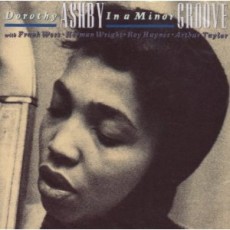
Daily Dose Of Jazz…
Dorothy Ashby was born Dorothy Jeanne Thompson on August 6, 1932 in Detroit, Michigan growing up around music where her father, guitarist Wiley Thompson, often brought home fellow jazz musicians. As a young girl, Dorothy would provide support and background to their music by playing the piano. She attended Cass Technical High with fellow students Donald Byrd, Gerald Wilson and Kenny Burrell. While in high school she played a number of instruments including the saxophone and string bass before coming upon the harp.
Attending Wayne State University in Detroit, Ashby studied piano and music education; graduated and began playing piano around the Detroit jazz scene. By 1952 she had made the harp her main instrument, and at first her fellow jazz musicians were resistant to the idea of adding the harp into jazz performances. Overcoming their initial resistance and perception of it being an instrument of classical music and also somewhat ethereal in sound, she built support for the jazz harp by organizing free shows and playing at dances and weddings with her trio.
She recorded with Ed Thigpen, Richard Davis, Jimmy Cobb, Frank Wess and others in the late 1950s and early 1960s and had her own radio show in Detroit. Ashby played with Louis Armstrong and Woody Herman, was included in Down Beat magazine’s Best Jazz Performances, and produced Black theater in Detroit by starting a theatrical group with her husband John Ashby providing a training ground for actors like Ernie Hudson,
By the late 1960s, the harpist settled in California breaking into the studio recording system with the help of the soul singer Bill Withers who recommended her to Stevie Wonder playing on the former’s +’Justments and the latter’s “If It’s Magic” in the Seventies. As a result, Dorothy played studio sessions for Dionne Warwick, Diana Ross, Earth, Wind & Fire, and Barry Manilow. She was featured in the song “Come Live With Me” on the soundtrack for the 1967 movie Valley of the Dolls.
Along with Alice Coltrane, Ashby extended the popularization of jazz harp past a novelty, showing how the instrument can be utilized seamlessly as much a bebop instrument as the saxophone. Her skill and creativity is recognized today and her musical legacy is enduring as numerous hip-hop musicians have sampled her music.
Dorothy Ashby, harpist and composer, passed away from cancer on April 13, 1986 in Santa Monica, California.
More Posts: harp

